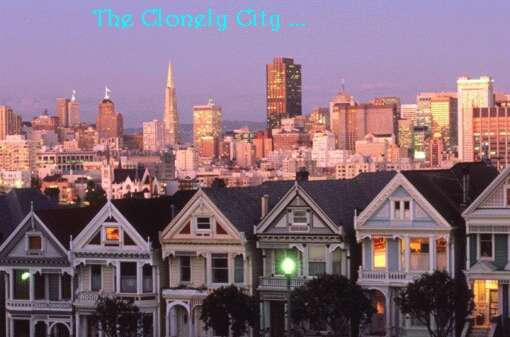The author of this article grew up in a small country village with a back garden that led to the open countryside and has since spent may years living alternately in country locations or in major towns or cities. He does not have 28 feet but likes rhubarb pie, peace and remaining anonymous.
All of us are, whether we like it or not, the product, or clones, of our environment. Ignoring the reality of that simply makes us more malleable to the effects of that environment.
City life is one of pressure. We are constantly exposed to other people and their problems in addition to our own, with small chance of escape despite the parks and walkways. Compounding this is the simple fact that cities are places of constant activity and hubbubs of business where many see them foremost as their place of work and not as the centres of residence that they also are.
The effects of living within a densely populated concrete jungle also vary depending on the circumstances of the individual. An upbringing in one the big apples of the world can still produce small town thinking in the individual luckless enough not to have experienced a broader environment. Perhaps it should be compulsory—a new national service—for everyone to spend at least three years living in the open countryside and away from large built up areas.
There is a subtle and vital difference between walking the bank of a country or a city river and it is not one of wildlife alone. It is the difference between a broader picture of a wider natural environment and the knowledge that natural features within cities are contained in a man-made environment created for and adapted principally to human life.
Scale is important too — a scale that is not associated with overall size.
Having seen the kingfisher on the banks of the country river, the country dweller may see few – if any – other people on his or her way home. They may have one or two or more close neighbours — or their nearest may be several miles distant. This scale of individual 'space' cannot be known nor is it properly understood by the city dweller unfortunate enough not to have known it for a period of time.
Just as real life is much more than its televised portraiture, so is the individual more than city limits. Ignoring that is fraught with risk,
The difficulty of course for the born and bred city dweller is the actual grasp of the reality of another style of living that is far different, just as can be said for the born and bred countryman. Identification with a different lifestyle through indirect experience is not the same and is as the difference between being burned for the very first time and imagining what it feels like to be burned.
The Brooklyn, Tokyo, Stepney, Delhi or any individual reared on an inner city estate is reared on a degree of deprivation of lifestyle, although this may be denied by the individual concerned. There is also for the inner city estate reared individual a much greater likelihood of deprivation through poverty see The Poverty Truth, although again this may not be as transparent and as simple as it appears on initial examination.
The true success of any society can be measured against its ability to enable its members to aspire to and reach ways of living that they can observe or visualise.
It's here! The PDF, that is.
By itself, it is innocuous, even trite. Yet is stands for something deadly alnd invasive. It is the Put down Factor. It is impossible to fully comprehend what it means to live in fear unless you have yourself done so.Putting on the bravado hat is all well and good in the mental arithmetic of working out a self-imagined perception of the reality of a victim to fear, but in the real world it counts for zilch.
Standing aloof in ignorant superiority accomplishes little of value but encourages the erosion of trust and the expansion of disdain. Fear will strangle a free lifestyle. It is no use dismissing the reality of fear.
Manners maketh man, not the clothing.
So. What is this world in which we all partake? Do we simply accept it, as some say? "That's the way of the world," as though that makes everything hunky dory.
If, as such semi-enlightened souls say, there is little or no point to changing the ways of the world, why then do we paint the exterior of our houses when they become weathered and in need of a fresh lick of paint? The weather is one way of the world, so why don't we just sit back and watch our houses fall to pieces because "its the way of the world"?
What tripe. Living secure in self-imposed cloistered ignorance is fine as long as you are afforded the freedom to live in such fashion. Bet if you did live like that, you'd be the first to kick up if the freedom to live as you chose was suddenly taken from you.
You can forever pretend that you are doing something 'worthwhile' with your time but just who are you really kidding?
The status quo is to be sent to school for about 10 years with a possible voluntary few extra years added on, then slog your guts out at some job or other to buy your requirements in life and pay the rent, then you retire when you're just about too old to really enjoy much anymore if you're lucky to make it that far that is.
And while all this is going on, someone somewhere is getting rich and living the good life by doing very little as a result of your labours. The way of the world? Ha. Whose world? Rise up peasants, you've been down too long.
You don't have to enter into violent confrontation, just quit living the life you consider you are supposed to live.
Trade, profits—this is all bunkum. If you are one of those who leeches off trade and profits then I am certain you will disagree with this sentiment.
composing on line - more to follow
to add to this topic, mail to : lifestyle
Top | Privacy | Comment | Links | Advertising | Contact
© Newsmedianews 07-Jul-2004


